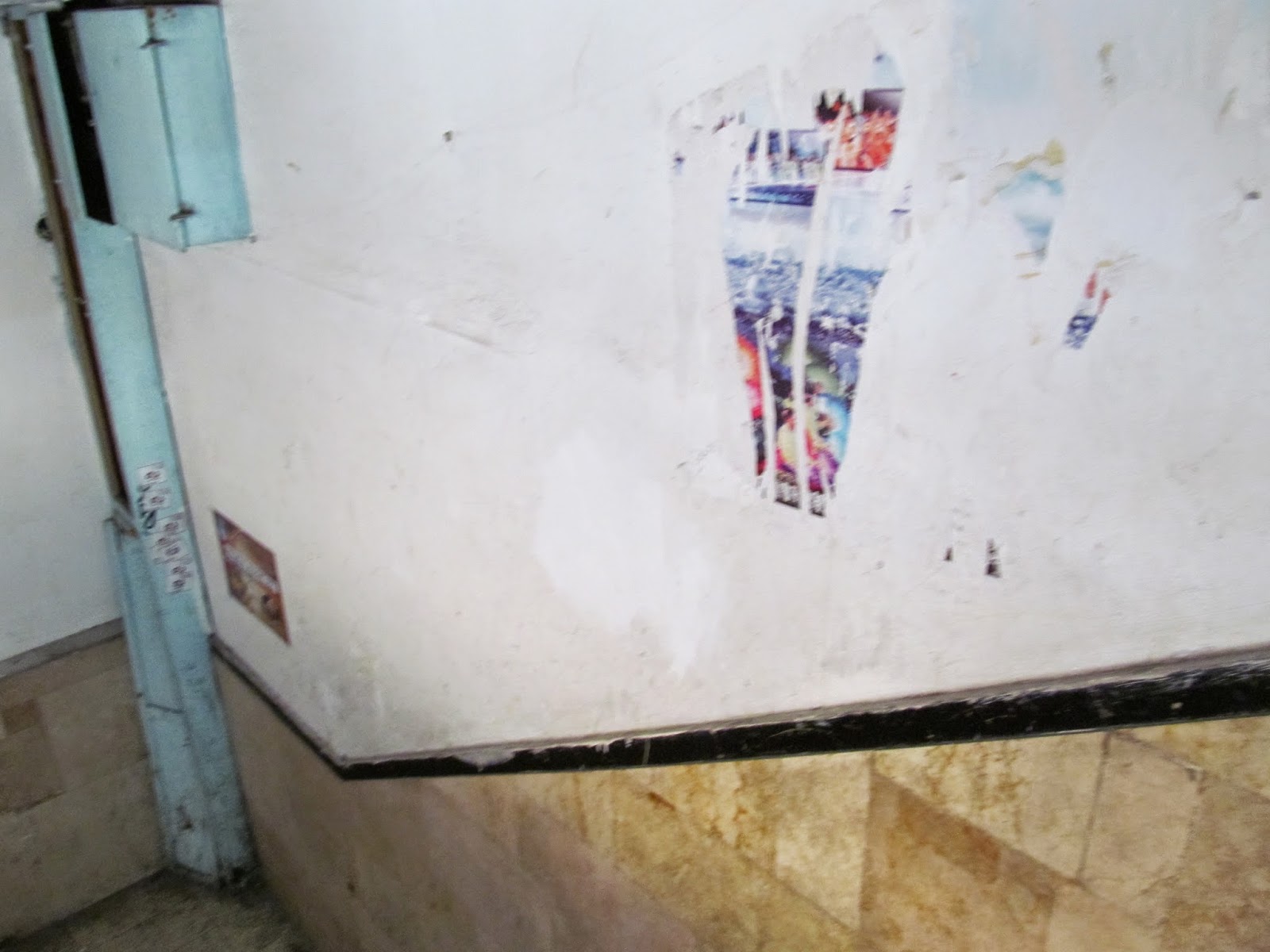Mary Boncher, my professor, and I pulled up a building that didn't look as if it were even in use, none the less the church we were scheduled to visit today for class.
Luckily Pastor Jeremiah was walking in as we arrived. With a warm smile and handshake he introduced himself and beckoned into the building. Up two flights of stairs that were falling apart.
A very strange coincidence. Walking in we saw this notice - a woman from Ghana had passed away this week. Her name was Lily and she died at 25.
I stood there aghast. This Lily had walked by this very spot for the last time this past Saturday and now a student from America, also Lily, also 25 was standing here for the first time.

And where posters left their remains despite human efforts.
A new poster giving a glimpse of hope - there might just be life somewhere in this building.
Then we came to the door. A door typical to Israel, especially in buildings built around the time of the 1967 and Yom Kippur wars. Blast doors.
And it was like we'd entered a new world.
Roughly 200 people attend this church, with core membership at about 100. In addition to functioning as a place of worship, the church converts the space into a shelter for homeless individuals, mostly political or economic refugees.
The story of how this Nigerian born pastor came to lead a congregation of immigrants, mostly here illegally but seeking asylum, starts halfway across the world in a town near Los Angeles. He and his wife, at the time pregnant with their first child, had canceled their hotel reservation thinking they could find a better hotel to stay in. It turns out every available room was booked. The pastor even begged to be allowed to stay in the lobby but was told no.
So he and his wife took to the streets, afraid and alone in a foreign country. A man came up to them and asked if they were alright. When they told him their situation, he said that he had a room in one of the nicest hotels in town. He would give them his room for free.
He felt so blessed, so relieved. But for the first time in his life he understood what it was like to be wandering around without a place to sleep. God put it on his heart to help others that were in that situation.
He opened a church in South Tel Aviv, in a building that had been mostly abandoned. A person had gone to a church down the street looking for shelter and they sent the person to Pastor Jeremiah. He took them to an office with storage and a single love seat pull-out couch. To that homeless person, it was a five star hotel.
Today 80-90 people sleep here every night. They are welcome up to three months so they have time to get on their feet before they leave. The pastor said that about 9000 people have taken shelter here since the church opened in 2007.
The service, conducted for people from Nigeria, Eritrea, Kenya, Sudan, South African, and a host of other nations left me, an American with a humbling sense of privilege, humbled and at the same time lifted up.
The message was "Love, The Mind of God." The love of God, he said is not the Greek love eros, and not philos, either - referring to a love much hard to break, like a marriage. But God is Agape love, unconditional love. Forgive, he admonished. Do not hold onto unforgiveness, but forgive as your God has forgive you.
Here he is, facing people who have experienced civil war and economic conditions unfathomable to a girl like me, and he is tell them to let go. Don't retaliate, let God take revenge. That's His job. If you hold onto the unforgiveness, that desire to retaliate it will poison you. Instead love unconditionally. "Anyone who does not love does not know God, because God is love," Pastor Jeremiah left us with (I John 4:8).
After the service Mary and I had the privilege to talk with some of the congregants, most of whom were from Nigeria. Many were lucky enough to get a Visa that allows them to stay in Israel, but not to work. So they end up taking jobs that pay under the table in horrible conditions. Many work 15-16 hour days in kitchens or restaurants.
When asked if anyone need prayer for something, one woman came up and knelt on the ground. Her son had been imprisoned back in South Sudan - and he was not a criminal, just a Christian. She had been frantically trying to get hold of her two other sons in South Sudan, without being able to reach them.
I will never forget, though, when the Pastor called Mary and I up to introduce us to the congregation. Everyone in the church came up to shake our hands. The men holding our hand in both of theirs like a loving father. Most of the women wrapped us in a hug that felt warmer than I had in a month. Complete strangers who felt not like strangers at all.
Seeing this church, a light in lives filled with so much darkness, made me believe that yes, Prayer Changes Things.















No comments:
Post a Comment